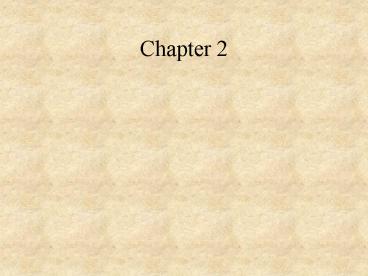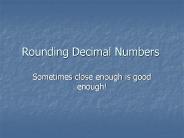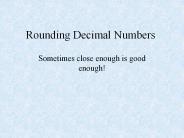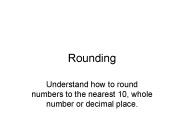Rounding Whole Numbers
1 / 168
Title:
Rounding Whole Numbers
Description:
... Letsons want a one-way truck rental, but must stay within a budget of $200. What ... will allow them to stay within budget (rounded to the nearest tenth of ... –
Number of Views:59
Avg rating:3.0/5.0
Title: Rounding Whole Numbers
1
Chapter 2
2
Section 2.1
3
Definitions
An EQUATION is a statement that two expressions
are equal. x 5 9 2a - 7 4
P 2L 2W
4
Definitions
To SOLVE an equation means to find a value for
the variable in the equation that makes the
equation a true statement when the value is
substituted in for the variable. Such a value is
called a SOLUTION to the equation.
5
Example
Is 5 a solution to the equation x 4 9?
6
Example
Is 8 a solution to the equation 4q 30?
7
Example
8
Example
9
Let a,b, and c be any numbers.
- Addition Property of Equality if a b,
then a c b c - Subtraction Property of Equality if a b,
then a - c b - c
10
Example
11
Example
12
Example
13
Let a,b, and c be any numbers, where c is not
equal to 0.
- Multiplication Property of Equality if
a b, then a(c) b(c) - Division Property of Equality if
a b, then a / c b / c
14
Example
15
Example
16
Example
17
Example
18
Example
19
Example
20
Example
21
Example
22
Example
23
Section 2.2
24
Solving Equations
- To solve an equation, do the following
- Simplify each side of the equation.
- Isolate the variable by addition or subtraction.
- Solve the equation by multiplication or division.
- Check the solution.
25
Example
26
Example
27
Examples
28
More Examples
29
(No Transcript)
30
Example
31
Examples
32
Special Equations
- An IDENTITY is an equation that is satisfied by
every number for which both sides are defined. - A CONTRADICTION is an equation that is never true
(also called an inconsistent equation). - A CONDITIONAL EQUATION is an equation that may be
true or false.
33
Identify the type of equation
34
(No Transcript)
35
(No Transcript)
36
Identify the type of equation
37
(No Transcript)
38
(No Transcript)
39
(No Transcript)
40
(No Transcript)
41
(No Transcript)
42
(No Transcript)
43
(No Transcript)
44
(No Transcript)
45
(No Transcript)
46
(No Transcript)
47
More Examples
48
(No Transcript)
49
(No Transcript)
50
More Examples
51
Section 2.3
52
Definition
53
Evaluating a formula
54
(No Transcript)
55
(No Transcript)
56
(No Transcript)
57
Solving for a variable
58
(No Transcript)
59
(No Transcript)
60
(No Transcript)
61
Solving formulas
- Identify the letter being solved for
- Clear fractions or decimals if necessary.
- Use addition to get all the terms with the letter
to be solved for on one side of the equation, and
all other terms on the other side. - Combine like terms, factor if necessary.
- Multiply or divide to solve for the letter.
62
(No Transcript)
63
(No Transcript)
64
(No Transcript)
65
(No Transcript)
66
(No Transcript)
67
Section 2.4
68
(No Transcript)
69
(No Transcript)
70
(No Transcript)
71
(No Transcript)
72
(No Transcript)
73
(No Transcript)
74
(No Transcript)
75
(No Transcript)
76
(No Transcript)
77
(No Transcript)
78
(No Transcript)
79
(No Transcript)
80
(No Transcript)
81
(No Transcript)
82
(No Transcript)
83
(No Transcript)
84
(No Transcript)
85
(No Transcript)
86
(No Transcript)
87
(No Transcript)
88
(No Transcript)
89
(No Transcript)
90
(No Transcript)
91
(No Transcript)
92
(No Transcript)
93
(No Transcript)
94
(No Transcript)
95
Section 2.5
96
Translating Phrasesthat involve addition
- The sum of 2 and x 2 x
- 8 increased by 2 8 2
- 7 more than v v 7
- 6 greater than x x 6
- Exceeds L by 20 L 20
97
Translating Phrasesthat involve subtraction
- The difference of 2 and y 2 - y
- c decreased by 2 c - 2
- 7 less than v v - 7
- 6 reduced by x 6 - x
- 20 less L 20 - L
98
Translating Phrasesinvolving multiplication
99
Translating Phrasesinvolving division
100
Translating the following phrases
101
Translating phrases
102
Write expressions for the following
103
Translating phrases
104
Definitions
105
Problem Solving
- Analyze the problem.
- Define your variables and form an equation.
- Solve the equation
- Check the solution
- State the conclusion
106
The sum of three consecutive integers is 51, find
the numbers.
- Find the three numbers.
- Let x be the smallest number, then
- x (x1) (x2) 51
- Now solve the equation
- Check the solution
- State the conclusion
107
The sum of three consecutive even integers is
114, find the numbers.
108
Two angles are complementary. If one angle is
twice the other, find the angles.
- Find the two angles.
- Let x be the smaller angle, then
- x 2x 90
- Now solve the equation
- Check the solution
- State the conclusion
109
Two angles are supplementary. If one angle is
triple the other, find the angles.
110
The perimeter of a tennis court is 228 ft. If the
length is 6 ft longer than twice the width, find
the length and width.
111
The sum of the angles in any triangle is 180
degrees.
112
(No Transcript)
113
(No Transcript)
114
Rate x Time Distance
115
(No Transcript)
116
(No Transcript)
117
On Monday, Roger drove to work in45 minutes. On
Tuesday he averaged12 miles per hour more and it
took him9 minutes less to get to work. How far
does he travel to work?
118
(No Transcript)
119
(No Transcript)
120
(No Transcript)
121
(No Transcript)
122
(No Transcript)
123
(No Transcript)
124
Section 2.6
125
Definitions
An INEQUALITY is a statement that compares the
size two unequal quantities.
126
Definitions
To SOLVE an inequality means to find a set of
values for the variable in the inequality that
makes the inequality a true statement when the
value is substituted in for the variable. Such a
value is called a SOLUTION to the inequality.
127
Graphs of inequalities
We can use a number line to graph solutions to
inequalities.
128
Example
129
Example
130
Notation
131
Let a,b, and c be any numbers.
- Addition Property of Inequality if a gt
b, then a c gt b c - Sub Property of Inequality if a gt b, then
a - c gt b - c
132
Example
133
Example
134
Let a,b, and c be any numbers, where c is
positive.
- Multiplication Property of Inequality
if a gt b, then a(c) gt b(c) - Division Property of Inequality if
a gt b, then a / c gt b / c
135
Let a,b, and c be any numbers, where c is
negative.
- Multiplication Property of Inequality
if a gt b, then a(c) lt b(c) - Division Property of Inequality if
a gt b, then a / c lt b / c
136
Example
137
Example
138
Example
139
Example
140
Solving Inequalities
- To solve an inequality, do the following
- Simplify each side of the inequality.
- Isolate the variable by addition or subtraction.
- Solve the inequality by multiplication or
division. Reverse the sign when multiplying or
dividing by a negative number. - Use a graph or set builder notation to describe
the solution.
141
(No Transcript)
142
More Examples
143
More Examples
144
Examples
145
Section 2.7
146
Problem Solving
- Analyze the problem.
- Define your variables and form an inequality.
- Solve the inequality
- Check the solution
- State the conclusion
147
(No Transcript)
148
Example
Simon claims that it costs him at least 3.00
every time he makes a phone call. If an average
call cost 0.75 plus 0.45 per minute, how long
does each call last?
149
Example
Ridem rents trucks at a daily rate of 42.95 plus
0.46 per mile. The Letsons want a one-way truck
rental, but must stay within a budget of 200.
What mileages will allow them to stay within
budget (rounded to the nearest tenth of a mile)?
150
Example
To remain on financial aid, Millie needs to
complete an average of at least 7 credits per
quarter each year. In the first three quarters of
this year she completed 5,7, and 8 credits. How
many units does Millie need to complete this
quarter to remain on financial aid?
151
Example
A 9-lb puppy is gaining weight at a rate of ¾
pound per week. When will the puppys weight
exceed 22.5 lbs?
152
Example
Find all numbers such that 3 times the number
minus 10 times the number is at least 8 times the
number.
153
Example
The width of a rectangle is fixed at 8 ft. What
lengths will make the perimeter at most 200 ft?
154
Example
Reduced Fat Hydrox cookies contain 4g of fat per
serving. In order for a food to be labeled
reduced fat, it must have at least 25 less fat
than the regular item. What can you conclude
about how many grams of fat are in regular Hydrox
cookies?
155
Solving Inequalities
- To solve an inequality, do the following
- Simplify each side of the inequality.
- Isolate the variable by addition or subtraction.
- Solve the inequality by multiplication or
division. Reverse the sign when multiplying or
dividing by a negative number. - Use a graph or set builder notation to describe
the solution.
156
(No Transcript)
157
More Examples
158
More Examples
159
Examples
160
Problem Solving
- Analyze the problem.
- Define your variables and form an inequality.
- Solve the inequality
- Check the solution
- State the conclusion
161
(No Transcript)
162
Example
Simon claims that it costs him at least 3.00
every time he makes a phone call. If an average
call cost 0.75 plus 0.45 per minute, how long
does each call last?
163
Example
Ridem rents trucks at a daily rate of 42.95 plus
0.46 per mile. The Letsons want a one-way truck
rental, but must stay within a budget of 200.
What mileages will allow them to stay within
budget (rounded to the nearest tenth of a mile)?
164
Example
To remain on financial aid, Millie needs to
complete an average of at least 7 credits per
quarter each year. In the first three quarters of
this year she completed 5,7, and 8 credits. How
many units does Millie need to complete this
quarter to remain on financial aid?
165
Example
A 9-lb puppy is gaining weight at a rate of ¾
pound per week. When will the puppys weight
exceed 22.5 lbs?
166
Example
Find all numbers such that 3 times the number
minus 10 times the number is at least 8 times the
number.
167
Example
The width of a rectangle is fixed at 8 ft. What
lengths will make the perimeter at most 200 ft?
168
Example
Reduced Fat Hydrox cookies contain 4g of fat per
serving. In order for a food to be labeled
reduced fat, it must have at least 25 less fat
than the regular item. What can you conclude
about how many grams of fat are in regular Hydrox
cookies?































